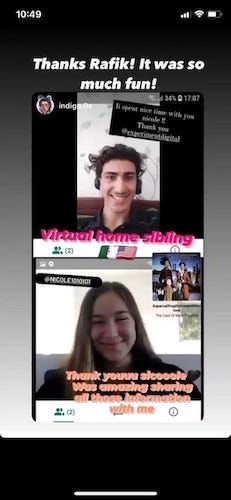This story was originally posted on the Stevens Initiative website. It has been republished here with permission.
Despite the unknown of the global pandemic, Nicole M. and Rafik A. joined World Learning’s The Experiment Digital to connect with others, share their experiences, and learn how to be changemakers in their communities. While stuck at home this past year, Nicole and Rafik set out through virtual exchange to learn what home means to their peers across the world.
At a time when face-to-face connection was not possible, Nicole and Rafik continued to build friendships with their peers in The Experiment Digital by participating in virtual homestays. Virtual homestay, an optional “choose your own adventure” type of activity, pairs The Experiment Digital participants with a peer in another country to share about their lives, values, cultures, and communities. Each homestay “sibling” pair engages in a homestay activity of their choice, with some of the suggested activities being hosting a virtual cooking class, giving a tour of their neighborhood, or creating a TikTok video together.

During their virtual exchange, Nicole and Rafik participated in a virtual homestay together, in addition to homestays with peers from Egypt and Iraq. One of Nicole’s homestays included a virtual tour of her peer’s community in Egypt. She remembers vividly what it was like to see rows of brightly colored spices, neighbors walking around barefoot, and strangers greeting each other on the street. “There were cultures and people that I had never encountered, things I had never experienced before,” reflected Nicole. “It was something you could not just read about in a book or watch in a movie. It had to be known through experience. And even though we were on the computer, it felt like I was there!” Nicole describes this experience in more detail during a TEDx talk she gave in April 2021.
“There were cultures and people that I had never encountered, things I had never experienced before. It was something you could not just read about in a book or watch in a movie. It had to be known through experience. And even though we were on the computer, it felt like I was there!” — Nicole, participant, World Learning’s The Experiment Digital
Designed to connect hundreds of young people across the United States with peers in the Middle East and North Africa (MENA) region, The Experiment Digital prepares participants to be more civically engaged and lead change. For eight weeks over the summer, participants take part in this online cultural exchange to practice digital etiquette, collaborative problem solving, and intercultural communication skills.
Before her virtual exchange, connecting with others did not always come easy. “Coming into The Experiment Digital, I wasn’t as great at making those person-to-person connections with people that were different from me,” shared Nicole. “I had to completely learn from scratch how to communicate and bring up meaningful conversations with people that have completely different lived experiences than me. That has been transformative of my understanding of myself because it’s allowed me to see the world in a far more vivid way and be able to see my own place in it.”
To bring her own community to her virtual homestay siblings, Nicole created a slideshow of videos and pictures of her childhood memories, her town, her passions, and her lived experiences to show what the U.S. and her home means to her. Even though they were physically in their own homes, Nicole and her peers were able to virtually share their homes with each other. “That was really special for me,” shared Nicole, “to learn about their homes, who they are, what they are passionate about, and what they love.” For Rafik, this was an opportunity to learn everything he could about life in the United States. “This virtual homestay gave me the chance to ask more questions about American culture and norms,” said Rafik, “I got an answer to every question that was running in my head before!”
“Before The Experiment Digital, I used to feel scared when it came to talking in a foreign language. But through the activities, discussions, and homestays, I got over that feeling and improved my speaking skills.” — Rafik, participant, World Learning’s The Experiment Digital
In addition to learning more about the United States, Rafik experienced personal changes. After The Experiment Digital, he feels more comfortable speaking openly with others, particularly in English. “Before The Experiment Digital, I used to feel scared when it came to talking in a foreign language. But through the activities, discussions, and homestays, I got over that feeling and improved my speaking skills,” he said. Nicole feels more confident in her ability to forge connections with others from different backgrounds and cultures. “The biggest thing I learned is that you must take advantage of opportunities the minute they come your way, or you might just miss out on something that would become a foundational piece of your life story. That’s how The Experiment Digital was for me.”


